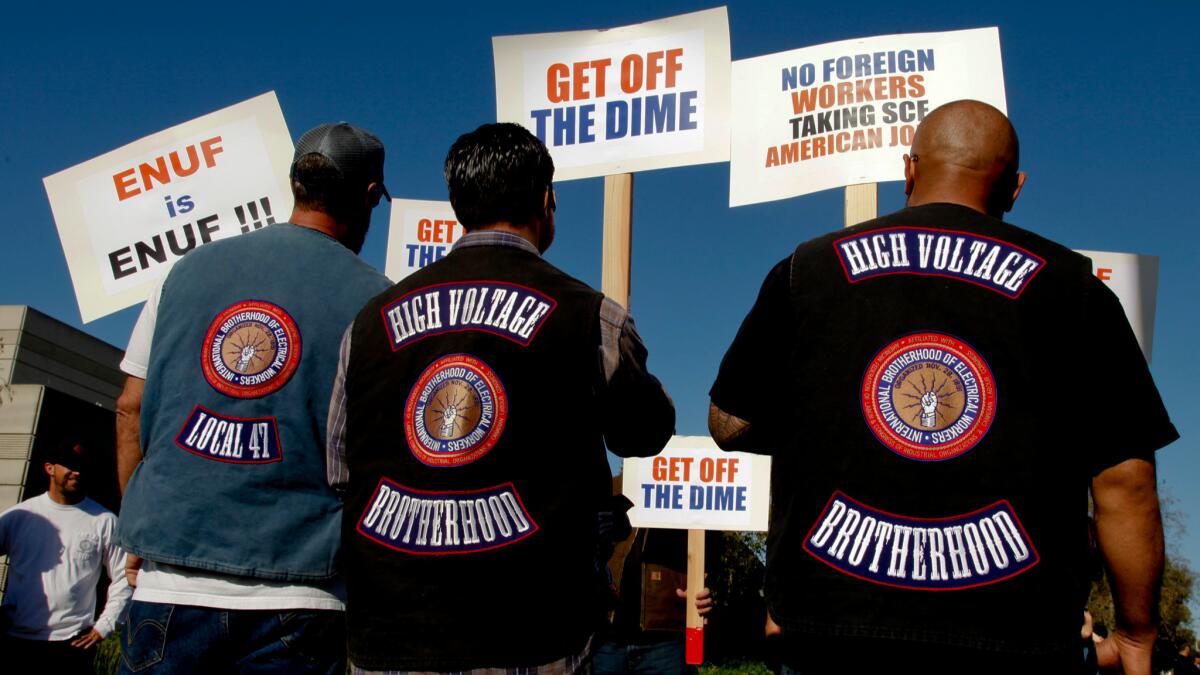Legislation would restrict H-1B visas

Companies that depend on H-1B visas for a substantial part of their workforce may soon have a tougher time hiring: Rep. Darrell Issa (R-Vista) has introduced legislation to restrict loopholes in their application process.
His proposal comes after Southern California Edison Co. laid off about 400 employees in early 2015 and brought in workers through consulting companies. Those consulting companies are heavy users of H-1B visas to obtain technology employees, reportedly at salaries that undercut those of American workers.
“It was pretty easy to see that wasn’t the intent of H-1B, which is to make up for shortage when you cannot find enough labor at any price,” Issa said.
Edison said at the time of the layoffs that it was “not hiring H-1B workers to replace displaced employees. Any H-1B visa workers SCE does hire for its own workforce are paid a wage comparable to SCE’s domestic workforce.”
Companies that have a certain proportion of H-1B employees — 15% or higher for companies with more than 50 employees — must submit paperwork with H-1B applications showing they advertised the job to American workers and considered their applications. Currently, employers can be exempted from that paperwork if the potential employee holds a master’s degree or is paid at least $60,000 annually.
The H-1B visa program allows workers to come to the United States with a temporary, non-immigrant status. The visa lasts three years with the option to renew for another three. While in the U.S., H-1B visa holders can apply for green cards. The U.S. allocates 85,000 H-1B visas per year, assigning them through a lottery.
Issa’s bill would remove the exemption for workers with a master’s degree and would increase the minimum salary needed for an exemption to $100,000 annually.
No hearing has been scheduled yet for Issa’s bill. It does have bipartisan support. Co-sponsors include four lawmakers from California, all of them from San Diego County: Democratic Reps. Scott Peters, Juan Vargas and Susan Davis and Republican Rep. Duncan Hunter.
In 2015, Los Angeles had 4,886 H-1B workers with an average salary of $79,278, according to a private website, Myvisajobs.com, which compiles employer applications to the federal government.
Almost 4,300 people were certified to work in San Diego on H-1B visas last year, according to data from the San Diego Regional Economic Development Corp. Qualcomm Technologies Inc. had the most such employees, 953, with an average annual salary of $102,095. Tata Consultancy Services Ltd., one of the consulting groups involved in the Edison controversy, was second with 103 employees certified for H-1B visas with an average annual salary of $74,559.
A representative for Tata, Benjamin Trounson, said: “We don’t engage in industry speculation, so there isn’t anything for us to offer on this topic at this stage.”
Qualcomm did not respond to requests for comment about whether it would be affected by the changes.
Matt Rifat, president of Alcala Labs, said he hired one employee through an H-1B visa for the company last year. He said Alcala recruited for 18 months for a geneticist and, after finding no one, pursued and hired an Austrian geneticist in 2015.
“For the scientific and biotech community, it’s really valuable, and, in my experience, it’s not being abused,” Rifat said of the H-1B program. “Had an American shown up with those qualifications, we would’ve hired them.”
Times staff writer Jim Puzzanghera contributed to this report.
More to Read
Inside the business of entertainment
The Wide Shot brings you news, analysis and insights on everything from streaming wars to production — and what it all means for the future.
You may occasionally receive promotional content from the Los Angeles Times.










